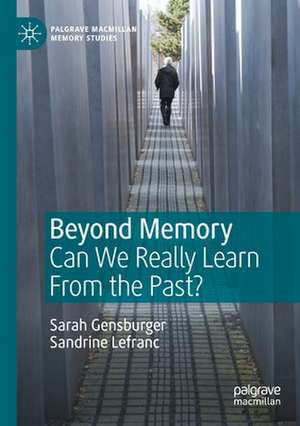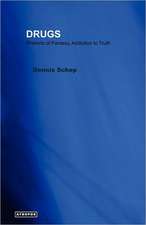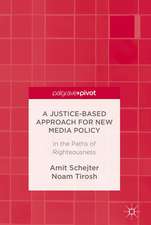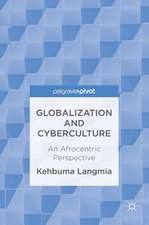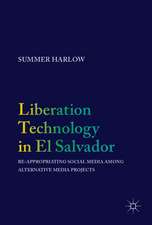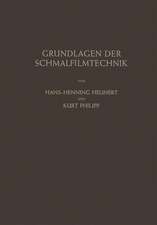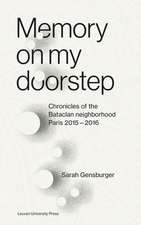Beyond Memory: Can We Really Learn From the Past?: Palgrave Macmillan Memory Studies
Autor Sarah Gensburger, Sandrine Lefranc Traducere de Katharine Throsselen Limba Engleză Paperback – 21 feb 2021
| Toate formatele și edițiile | Preț | Express |
|---|---|---|
| Paperback (1) | 477.34 lei 6-8 săpt. | |
| Springer International Publishing – 21 feb 2021 | 477.34 lei 6-8 săpt. | |
| Hardback (1) | 483.55 lei 6-8 săpt. | |
| Springer International Publishing – 21 feb 2020 | 483.55 lei 6-8 săpt. |
Din seria Palgrave Macmillan Memory Studies
-
 Preț: 358.89 lei
Preț: 358.89 lei -
 Preț: 191.48 lei
Preț: 191.48 lei - 18%
 Preț: 726.37 lei
Preț: 726.37 lei - 20%
 Preț: 691.81 lei
Preț: 691.81 lei -
 Preț: 357.50 lei
Preț: 357.50 lei - 18%
 Preț: 894.46 lei
Preț: 894.46 lei -
 Preț: 382.36 lei
Preț: 382.36 lei - 15%
 Preț: 644.18 lei
Preț: 644.18 lei -
 Preț: 390.63 lei
Preț: 390.63 lei -
 Preț: 382.57 lei
Preț: 382.57 lei - 15%
 Preț: 701.40 lei
Preț: 701.40 lei -
 Preț: 389.70 lei
Preț: 389.70 lei - 18%
 Preț: 782.42 lei
Preț: 782.42 lei -
 Preț: 387.75 lei
Preț: 387.75 lei -
 Preț: 384.86 lei
Preț: 384.86 lei -
 Preț: 392.37 lei
Preț: 392.37 lei -
 Preț: 387.75 lei
Preț: 387.75 lei - 15%
 Preț: 637.78 lei
Preț: 637.78 lei - 18%
 Preț: 776.22 lei
Preț: 776.22 lei - 15%
 Preț: 583.45 lei
Preț: 583.45 lei - 15%
 Preț: 582.12 lei
Preț: 582.12 lei - 15%
 Preț: 642.51 lei
Preț: 642.51 lei - 15%
 Preț: 641.03 lei
Preț: 641.03 lei - 15%
 Preț: 585.26 lei
Preț: 585.26 lei - 15%
 Preț: 641.03 lei
Preț: 641.03 lei - 15%
 Preț: 580.68 lei
Preț: 580.68 lei -
 Preț: 388.13 lei
Preț: 388.13 lei -
 Preț: 380.84 lei
Preț: 380.84 lei -
 Preț: 388.72 lei
Preț: 388.72 lei -
 Preț: 385.08 lei
Preț: 385.08 lei -
 Preț: 386.81 lei
Preț: 386.81 lei -
 Preț: 386.81 lei
Preț: 386.81 lei - 15%
 Preț: 641.03 lei
Preț: 641.03 lei -
 Preț: 383.71 lei
Preț: 383.71 lei - 18%
 Preț: 726.69 lei
Preț: 726.69 lei - 15%
 Preț: 582.63 lei
Preț: 582.63 lei -
 Preț: 387.58 lei
Preț: 387.58 lei -
 Preț: 387.75 lei
Preț: 387.75 lei - 15%
 Preț: 699.77 lei
Preț: 699.77 lei - 15%
 Preț: 697.00 lei
Preț: 697.00 lei
Preț: 477.34 lei
Nou
Puncte Express: 716
Preț estimativ în valută:
91.34€ • 97.67$ • 76.16£
91.34€ • 97.67$ • 76.16£
Carte tipărită la comandă
Livrare economică 18 aprilie-02 mai
Preluare comenzi: 021 569.72.76
Specificații
ISBN-13: 9783030342043
ISBN-10: 3030342042
Pagini: 128
Ilustrații: VII, 128 p.
Dimensiuni: 148 x 210 mm
Greutate: 0.17 kg
Ediția:1st ed. 2020
Editura: Springer International Publishing
Colecția Palgrave Pivot
Seria Palgrave Macmillan Memory Studies
Locul publicării:Cham, Switzerland
ISBN-10: 3030342042
Pagini: 128
Ilustrații: VII, 128 p.
Dimensiuni: 148 x 210 mm
Greutate: 0.17 kg
Ediția:1st ed. 2020
Editura: Springer International Publishing
Colecția Palgrave Pivot
Seria Palgrave Macmillan Memory Studies
Locul publicării:Cham, Switzerland
Cuprins
1. Introduction.- 2. The making of memory policies.- 3. Memory policies in action.- 4. The effects of memory.- 5. Conclusion.
Notă biografică
Sarah Gensburger is a Senior Researcher in Social Sciences at the French National Center for Scientific Research, France. Her work focuses on public policies of memory and social appropriations of the past in Western democracies.
Sandrine Lefranc is a Senior Researcher in Social Sciences at the French National Center for Scientific Research, France. Her work focuses on post-conflict societies and transitional justice.
Sandrine Lefranc is a Senior Researcher in Social Sciences at the French National Center for Scientific Research, France. Her work focuses on post-conflict societies and transitional justice.
Textul de pe ultima copertă
This book provides a fresh perspective on the familiar belief that memory policies are successful in building peaceful societies. Whether in a stable democracy or in the wake of a violent political conflict, this book argues that memory policies are unhelpful in preventing hate, genocide, and mass crimes. Since the 1990s, transmitting the memory of violent pasts has been utilised in attempts to foster tolerance and fight racism, hate and antisemitism. However, countries that invested in memory policies have overseen the rise of hate crimes and populisms instead of growing social cohesion. Breaking with the usual moralistic position, this book takes stock of this situation. Where do these memory policies come from? Whom do they serve? Can we make them more effective? In other words, can we really learn from the past? At a time when memory studies is blooming, this book questions the normative belief in the effects of memory.
Caracteristici
Examines why hate crimes and populism have increased in drastic proportions despite developments in memory policies over the last thirty years Provides a fresh perspective on the familiar belief in the efficiency of memory policy in building peaceful societies, whether in a stable democracy or in the wake of a violent political conflict Argues that memory policies are mostly unhelpful in preventing hate, genocide and mass crimes
